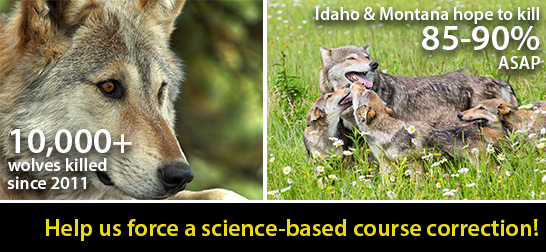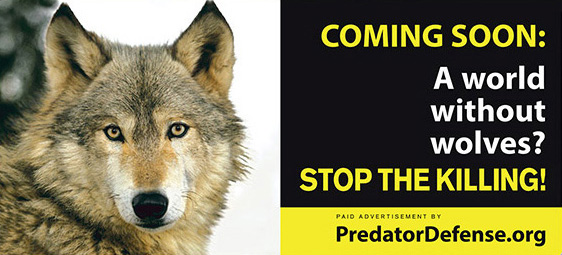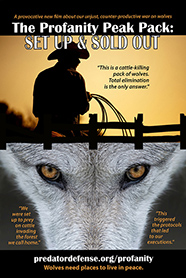The Plight of Wolves in America
Gray wolf protections were restored in most western states and the Great Lakes region on Feb. 10, 2022, but not in the Northern Rockies, where hunters and trappers remain in a full killing frenzy. Idaho and Montana have each reported killing hundreds of wolves yearly since 2021. But their official numbers are barely worth tracking, as scientists estimate that unreported, illegal kills abound and any decrease in kill numbers over time may indicate a collapsing population. Even worse, in Feb. 2024 USFWS decided to ingore the best available science and failed to relist wolves under the Endangered Species Act. Protection for wolves in the Northern Rockies is imperative.

A Brief History
Gray wolves were rescued from the brink of extinction in the 1970s, but remain "unrecovered" according to top scientists. Disregarding the science, the federal government began stripping Endangered Species Act (ESA) protections in 2011 and transferring management to the states. More History
This ESA "delisting" led to hunters and trappers killing over 8,000 wolves in seven states between 2011-2019 and all federal protections being removed in 2020. We conservatively estimate at least 2,000 more wolves have since been killed. The multi-state killing frenzy kicked into high gear in 2021, when Wisconsin slaughtered 216 wolves in 3 days and Montana and Idaho passed laws allowing them to kill 85-90 percent, respectively. Montana and Idaho continue to move full speed ahead toward that goal. We have spoken out since the start, working with scientists and activists urging a full emergency ESA relisting.
Appallingly, on Feb. 2, 2024, the U.S. Fish and Wildlife Service (USFWS) announced it would not relist wolves. In response we have joined forces with other conservation groups to force a science-based course correction. Together we will sue USFWS for ignoring the best available science, using flawed population models, and not relisting wolves under the Endangered Species Act. You can help power our actions by donating to support our work.
A Chronology of Events Leading to USFWS's Flawed Decision
On Sept. 15, 2021 the U.S. Fish & Wildlife Service announced that they found our collective petitions urging emergency relisting of wolves under the ESA substantive and credible. But their comprehensive review wasn't due until until mid-2022 and still hadn't been announced as of January 2023. So we joined with six advocacy groups to announce plans to sue.
Meanwhile, wolves' need for protection increases by the day. On September 27, 2021 the National Park Service announced that three Yellowstone wolves had already been killed by hunters in Montana. By early March 2022, at least 25 Yellowstone wolves had been officially reported killed, but 64 wolves have been reported as killed near the park border, which means the number of park wolves killed may be higher. All Yellowstone wolves are at risk, due to the heinous wolf policies of Idaho, Montana and Wyoming, which border the park. Montana's 2021 legislation allows the slaughter of up to 85 percent of their wolves, while Idaho's allows for the killing of 90 percent. Wyoming has been killing wolves with abandon for some time. To make matters worse, over a third of the boundary Yellowstone shares with Montana is within a mile of private property where baiting is now allowed. (Wolves sense of smell can extend for miles!)
Given that wolves don't understand invisible boundary lines--and the fact that hunters and trappers are literally waiting for them to step out of the park--we saw that Yellowstone's entire wolf population could be destroyed before USFWS finished its review. As an emergency measure, on Oct. 27, 2021 we urged the U.S. Forest Service to establish a 5-mile wolf hunting and trapping setback around Yellowstone and Grand Teton National Parks. This is part of an effort we helped facilitate with Footloose Montana. Over three dozen organizations and individuals have signed on and we encourage you to join in.
- Press release urging 5-mile no-hunting/trapping zone around Yellowstone and Grand Teton National Parks
- Letter to USDA Secretary, Thomas Vilsack urging a 5-mile setback
- Add your name to the letter to Secretary Vilsack
On Oct. 28, 2021 more than 20 U.S. senators sent a letter to Interior Secretary Deb Haaland urging immediate emergency protections for wolves in U.S. West, to shield them for the next 240 days while true ESA relisting protections are considered. The Senators' letter is one of the pressure campaigns we've been working on with other groups behind the scenes. We are very grateful to Senator Cory Booker (D-New Jersey) for hearing all our voices and taking the lead in the Senate by standing up for wolves in this way. Read AP news story
On Dec. 15, 2021, a bipartisan group of 78 U.S. Representatives, led by U.S. Rep. Peter DeFazio (D-OR), also urged Sec. Haaland to immediately issue an emergency ESA relisting. Read press release |Signed MOC letter
Growing increasingly concerned about Sec. Haaland's lack of action to protect wolves, Rep. DeFazio spoke with her by phone on Jan. 19, 2022 to clarify the dire need for emergency protections. He was gravely disapopinted by her refusal to commit and issued an official statement after the call. "There is simply no reason for Secretary Haaland to continue a Trump-era policy that threatens the existence of a species," DeFazio said. "I am disappointed she has chosen to delay this vital action to stop the slaughter. It has taken decades to bring this species back from near extinction. Their survival depends on her immediate action. If the Administration fails to act now, we may not have another chance to save the gray wolf.” Read press release | News story We highly applaud DeFazio's persistence and courage. He has long been the undisputed champion for wolves in the U.S. Congress and we will greatly miss him when he retires later in 2022.
On Feb. 8, 2022 Sec. Haaland responded with an op-ed in USA Today. She hit all the right notes, describing her respect for science, law and Native American culture. But, alarmingly, she appears ready to defer to USFWS and the alleged "best available science" and data they claim to respect. It is far from that. See details in our updated sample letter to Sec. Haaland and send her a message today.
Partially good news came on Feb. 10, 2022, when a federal judge restored protections for wolves in parts of the West, but not in the Northern Rockies, where functional extinction is well underway. Wolves in Idaho, Montana, Wyoming, eastern Oregon, and eastern Washington remain in dire need of protection.
On Feb. 15, 2022 Rep. Defazio again urged Sec. Haaland to relist wolves in the Northern Rockies. Read press release
Regardless of all pressure exerted, we continued to wait for the Interior Department and USFWS to release the review decision due in September 2022 on relisting gray wolves in the Northern Rocky Mountains under the Endangered Species Act (ESA), as well as for the establishment of a no-hunting buffer around Yellowstone National Park. Their delay was both unlawful and devastating for wolves. In hopes of prompting action, we joined with six advocacy groups in January 2023 to give these agencies a 60-day Notice of Intent (NOI) to sue if they ultimately announced they would not relist wolves. On Feb. 7, 2024 we joined with other conservation groups suing to force a science-based course correction. Read press release
Top Wolf News & Opinions
- Groups to sue feds over decision not to list wolves - Missoula Current, Feb. 7, 2024
- Feds: Protection not needed for Northern Rockies Gray Wolves - Missoula Current, Feb. 2, 2024
- New study links human-caused wolf mortality to pack collapse - Idaho Mountain Express, Feb. 1, 2023
- Idaho Fish and Game wants to reduce the wolf population by 60% - Boise State Public Radio, Jan. 27, 2023
- When humans kill Yellowstone wolves — intentionally or not — pack dynamics suffer - Powell Tribune, Jan. 24, 2023
- Rocky Mountain Massacre: Was Yellowstone's deadliest wolf hunt in 100 years an inside job? - The Intercept, July 20, 2022
- Yellowstone: Wolf hunt altered behavior, damaged research - Wyofile, Apr. 26, 2022
- Opinion: Feds must act now to protect Yellowstone's wolves - guest column by Collette Adkins, Bozeman Daily Chronicle, Mar. 6, 2022
- ‘Unprecedented killing’: The deadliest season for Yellowstone’s wolves - On the 150th anniversary of America’s first national park, one-third of its wolves are dead - Washington Post, Mar. 4, 2022
- $22,500 Reward Offered for Info on Illegal Killing of Wolf in Northeast Oregon - Tillamook Headlight Herald, Feb. 26, 2022
- Opinion: Interior Secretary misleads public on success of gray wolf recovery - Missoulian, Feb. 24, 2022
- Science and Ethics Agree: Coexistence Must Replace Killing Wolves, Part 2 of 2 - PAN Works, Feb. 24, 2022
- Science and Ethics Agree: Coexistence Must Replace Killing Wolves, Part 1 of 2 - PAN Works, Feb. 17, 2022
- DeFazio, Beyer, Grijalva urge Secretary Haaland to relist the Northern Rocky population of the gray wolf - press release by Congressman Peter DeFazio (D-Oreg), Feb. 15, 2022
- Gray wolf federal protections removed by Trump restored across much of US - The Guardian, Feb. 10, 2022. Note: Ruling does NOT restore protections for wolves in the Northern Rockies, which include Idaho, Montana, Wyoming, and the eastern third of Oregon & Washington.
- Interior Secretary Deb Haaland Speaks Up On Wolves, But Is It Enough? - Mountain Journal, Feb. 8, 2022
- Rep. DeFazio calls for emergency protections for gray wolves - Oregon Public Broadcasting, Jan. 20, 2022
- Congressman DeFazio issues statement following call with Secretary Haaland on threat to gray wolves' existence - press release by Congressman Peter DeFazio (D-Oreg), Jan. 19, 2022
- A slaughter of wolves like this hasn’t been seen in a century - The New York Times, Jan. 17, 2022
- Senseless' killing of young Oregon wolf prompts $16,500 reward for information - Newsweek, Jan. 14, 2022
- Hunters kill 20 Yellowstone wolves that roamed out of park - Associated Press Jan. 6, 2022
- Oregon police seek clues in poisoning of eight wolves - BBC News, Dec. 2, 2021
- Senators urge emergency protections for wolves in US West - Associated Press, Oct. 28, 2021
- Groups petition federal government for setback for wolf hunting and trapping on land bordering Yellowstone, Grand Teton - Bozeman Daily Chronicle, Oct. 28, 2021
- Groups urge 5-mile wolf hunting & trapping setback around Yellowstone & Grand Teton National Parks - press release from Footloose Montana, Predator Defense, Wester, Watersheds Project, Oct. 27, 2021
- Oregon kills 3 more wolves for attacking cattle - AP News, Oct. 20, 2021
- Eight wolf pups, long studied by high school students, slaughtered by federal agents (in Idaho) - ladyfreethinker.org, Oct. 19, 2021
- Three Yellowstone wolves killed in Montana during first week of Montana’s hunting season - National Park Service press release Sept. 27, 2021
- Montana Wolf Policies Are Destroying State's Reputation As Beacon For Wildlife Management - opinion piece by former wildlife commisisoners in Mountain Journal, Sept. 26, 2021
- Red States’ Wolf-Killing Campaign May Have Just Backfired - HuffPost, Sept. 15, 2021
- Wolves in Northern Rockies One Step Closer to Endangered Species Protection - press release from Center for Biological Diversity, Sept. 15, 2021
- Service to Initiate Status Review of Gray Wolf in the Western U.S. - press release from U.S. Fish & Wildlife Service, Sept. 15, 2021
- Montana Defiantly Puts Yellowstone Wolves In Its Crosshairs - Mountain Journal, Sept. 9, 2021
- Mirror, mirror on the wall: The wolf as scapegoat - opinion by Dr. Paul C. Paquet, world-renowned large predator ecologist, Raincoast Conservation Foundation, Sept. 9, 2021
- Wolves in Idaho, Montana could get federal oversight - AP News, Aug. 25, 2021
- Rep. DeFazio slams wolf pup killing by the state of Oregon - press release from Congressman Peter DeFazio (D-Oreg), Aug. 4, 2021
- Opinion | Cruelty toward wolves is erasing conservation efforts. It’s time to reinstate their protections. - by Daniel M. Ashe, former director of USFWS, The Washington Post, Aug. 3, 2021
- Coalition seeks relisting of gray wolves in US West as states pass laws to drastically cut their numbers - The Associated Press in The Colorado Sun, July 30, 2021
- Petition to List the Western North American Poulation of Gray Wolves as a Distinct Population Segment - formal petition submitted to the U.S. Secretary of Interior acting through the U.S. Fish and Wildlife Service, July 29, 2021
- Bipartisan Delegation Of 85 Representatives Urges Interior Department To Relist Gray Wolves - Office of U.S. Congressman Don Beyer, Virginia's 8th District, July 29, 2021
- The federal government must step in to save America's wolves - Op-ed by Stephen Capra in The Hill, July 22, 2021
- Letter from U.S. Congressman Peter DeFazio (D-Oreg.) urging emergency ESA relisting for Northern Rocky Mountain wolves - sent to Interior Secretary Deb Haaland and USFWS Dep. Director Martha Williams, June 28, 2021
- Why state management of wolves is a threat to their recovery - Counterpunch, May 27, 2021
- Emergency petition to relist gray wolves in the Northern Rocky Mountains as an endangered or threatened "Distinct Population Segment" under the ESA - sent to Interior Secretary Deb Haaland and USFWS Dep. Director Martha Williams by Center for Biological Diversity and The Humane Society of the United States, May 26, 2021
- Letter from 50+ citizens, businesses and environmental groups urging reinstatement of federal wolf protections - sent to Interior Secretary Deb Haaland and USFWS Dep. Director Martha Williams, May 17, 2021
- Letter from 100+ scientists urging reinstatement of federal wolf protections - sent to Interior Secretary Deb Haaland and USFWS Dep. Director Martha Williams, May 13, 2021
- Scientists urge restoration of federal gray wolf protections - ABC News, May 13, 2021
- Montana has made killing wolves easier. Some hunters are pushing back. - National Geographic, May 13, 2021
- New Idaho law allows killing up to 90 percent of state’s wolves - National Geographic, May 7, 2021
- Never decry wolf: they deserve our protection, not 'management' - Opinion by Cyril Christo, The Hill, Mar. 12, 2021
- Wisconsin Shuts Down Hunt After 216 Wolves Are Killed In 3 Days - HuffPost, Feb. 26, 2021
The History: Removal from Federal Endangered Species List in 2011 Spelled Doom for American Wolves
Wolves were rescued from the brink of extinction in the 1970s when they gained federal protection under the Endangered Species Act. But on April 15, 2011, when President Obama signed the federal budget into law, he also signed the death warrants for thousands of wolves in the Lower 48. This happened because Senator Jon Tester (D-Mont.) added a last-minute wolf-killing rider that removed wolves from the federal Endangered Species Act (ESA) in states that had managed to establish significant populations.
The reality was wolves had barely managed to gain a toehold and reoccupy territory from which they'd been recently extirpated by ranching and agricultural interests. They were not "recovered" by ESA standards. They did not occupy a significant portion of their historial range, and they did not meet the U.S. Fish and Wildlife Service's own conservation principles for recovery--the 3 Rs, which include resiliency, redundancy and representation across of range of ecological contexts. Tester's rider also prohibited further judicial review, which meant conservation interests were no longer able to legally intervene.
This 2011 "delisting" turned management of these majestic animals over to state wildlife agencies. State managers moved quickly to open hunting seasons on wolves in Idaho, Montana, Wyoming, Minnesota and Wisconsin. In subsequent years over 8,000 wolves have been senselessly slaughtered by sport hunters and trappers alone in Idaho, Montana, Wyoming, Minnesota, Wisconsin and Michigan--1,141 were killed during the 2012-13 season alone. These kill numbers do not include the scores of wolves slaughtered by poachers and federal and state predator control programs. Nor do these numbers include Alaska, which is a whole different ball of wax, with a killing frenzy that has raged unabated for decades.
Never in the history of the Endangered Species Act had a species been delisted because of politics. Wildlife management and politics hit a new low and established a dangerous precedent. Wolf management has swung full circle in 50 years from extermination to recovery, and back again. Free roaming packs of wolves in America will be lucky to survive, much less thrive, anywhere outside of the national parks, where they are protected. Hunters and trappers also gained access to wolves by lying in wait for them when they cross the park boundaries, as has happened in Montana.
Please read the following for more details:
- Groups Lay Out Opposition to Proposed Wolf Settlement - Billings Gazette, March 23, 2011
- True Cost of Budget Deal Will Be Paid in Blood...of Gray Wolves - Christian Science Monitor, April 19, 2011
- 'Famous' Wolf Is Killed Outside Yellowstone - New York Times, Dec. 8, 2012
- Montana Officials Shut Down Wolf Hunting, Trapping near Yellowstone - Missoulian, December 10, 2012
- Montana: Wolf Hunts Are Banned in Areas Bordering Yellowstone - New York Times, Dec. 10, 2012
- Mourning an Alpha Female - New York Times, Dec. 10, 2012
- Judge Keeps Wolf Hunting Season Going outside Yellowstone National Park - OregonLive.com, Jan. 18, 2013
- Letter against "delisting" wolves, sent by 16 of nation's top scientists to Sally Jewell, Secretary, Department of the Interior - May 21, 2013
- After Years of Progress, A Setback in Saving the Wolf - New York Times, June 1, 2013
- Mystery Grand Canyon Animal Is a Gray Wolf—Can It Survive? - National Geographic, Dec. 10, 2014
Independent Peer Review Panel Determined Government's Wolf Delisting Proposal Was Based on Outdated and Flawed Science
In early 2014 we had a special reason reason for hope that conservation science, not political science, would determine the future of America's imperiled gray wolves--that they would be able to continue to recover and expand their range into land the species once roamed and called home.
The reason for hope was two-fold: Not only did USFWS receive over a million comments on their ill-advised proposal to remove protections for wolves nationwide, but in February 2014 a scientific peer review panel rejected their proposal.
What happened was USFWS canceled the first peer review in the wake of a scandal exposing their biased methodologies. Then the National Center for Ecological Analysis and Synthesis at U.C. Santa Barbara took over peer review of the delisting proposal and provided a fair, professional, and scientific analysis. The reviewers in this independent panel unanimously decided that wolf delisting was not supported by the best available science and that removing protections would be premature. The NCEAS peer review report exposed the shoddy work and bias toward hunting and livestock interests behind the USFWS delisting proposal.
As a result, USFWS opened an additional 45-day public comment period that ran February 10-March 27, 2014. Countless people submitted comments, telling USFWS they knew their initial study was flawed and taking them to task for not operating in good faith with the public by willfully ignoring, discounting, and in some cases misrepresenting the best available science.
- Read independent peer review report by NCEAS
- Read USFWS press release
- "Panel: Wolf delisting decision based on unproven science" - Missoulian, Feb. 8, 2014
- "U.S. plan to lift wolf protections in doubt after experts question science" - Science Insider, Feb. 8, 2014
- "Delist gray wolf from threatened and endangered list? Panel issues report on science" - Science Daily, Feb. 7, 2014
Watch Our Film, "The Imperiled American Wolf"
Our 2012 film, "The Imperiled American Wolf," explains the reasons wolves cannot be successfully managed by state wildlife agencies: not only do their methods ignore the core biology of how wolves hunt and breed, but their funding depends on hunting and trapping fees. In fact, current wolf management may actually lead to wolves' demise. Predator Defense and this film make a bold call for federal relisting of these important apex predators as endangered species.
The war being waged against wolves is senseless and tragic, and it is up to all of us to speak out now on their behalf (details below).
Inspiring Letters from Citizens, Scientists and Members of Congress
We believe you may find inspiration in some of the letters below:
- Letter from 21 U.S. Senators urging immediate emergency protections to shield wolves from being killed while permanent protections are considered by USFWS - sent to Interior Secretary Deb Haaland by Cory Booker (D-New Jersey) and Gary Peters (D-Mich.), et al, Oct. 28, 2021
- Letter from U.S. Congressman Peter DeFazio (D-Oreg.) urging emergency ESA relisting for Northern Rocky Mountain wolves - sent to Interior Secretary Deb Haaland and USFWS Dep. Director Martha Williams, June 28, 2021
- Letter from 50+ citizens, businesses and environmental groups urging reinstatement of federal wolf protections - sent to Interior Secretary Deb Haaland and USFWS Director Martha Williams, May 17, 2021
- Letter from 100+ scientists urging reinstatement of federal wolf protections - sent to Interior Secretary Deb Haaland and USFWS Director Martha Williams, May 13, 2021
Petitions to Interior Secretary Deb Haaland via USFWS, Urging Emergency ESA Relisting for Western Wolves
We are one of 70 groups who filed a formal petition on July 29, 2021 (see below) urging emergency ESA relisting to stop Idaho, Montana, and other western states' plans to kill as many wolves as possible. We also support the earlier petition filed on May 26, 2021.
- Petition to List the Western North American Population of Gray Wolves as a Distinct Population Segment - formal petition submitted to the U.S. Secretary of Interior acting through the U.S. Fish and Wildlife Service, July 29, 2021
- Emergency petition to relist gray wolves in the Northern Rocky Mountains as an endangered or threatened "Distinct Population Segment" under the ESA - sent to Interior Secretary Deb Haaland and USFWS Director Martha Williams by Center for Biological Diversity and The Humane Society of the United States, May 26, 2021
USFWS Deemed Our Petitions Substantive & Credible; Then They Failed
On Sept. 15, 2021, the U.S Fish & Wildlife Service (USFWS) announced they'd reviewed our collective petitions (see previous section), found them substantive and credible, and would perform a comprehensive review on restoring wolf protections in the Western U.S.
- Service to Initiate Status Review of Gray Wolf in the Western U.S. - U.S. Fish & Wildife press release, Sept. 15, 2021
- Wolves in Northern Rockies One Step Closer to Endangered Species Protection - press release from Center for Biological Diversity, Sept. 15, 2021
Alas, USFWS failed to acknowledge the best-available science and used flawed population models in their review. On Feb. 2, 2024 they announced they would not protect Western wolves under the Endangered Species Act (ESA).
Help Us Hold USFWS Accountable in Lawsuit to Protect Wolves
We continue to urge the U.S. Fish and Wildlife Service (USFWS) to course-correct to stop the ongoing wolf slaughter in the Northern Rockies. In February 2024 we were one of 10 groups who joined forces to sue USFWS for ignoring the best available science, using flawed population models, and not relisting wolves under the Endangered Species Act. You can help power our actions by donating to support our work. Any amount helps our work for wolves and is greatly appreciated.



